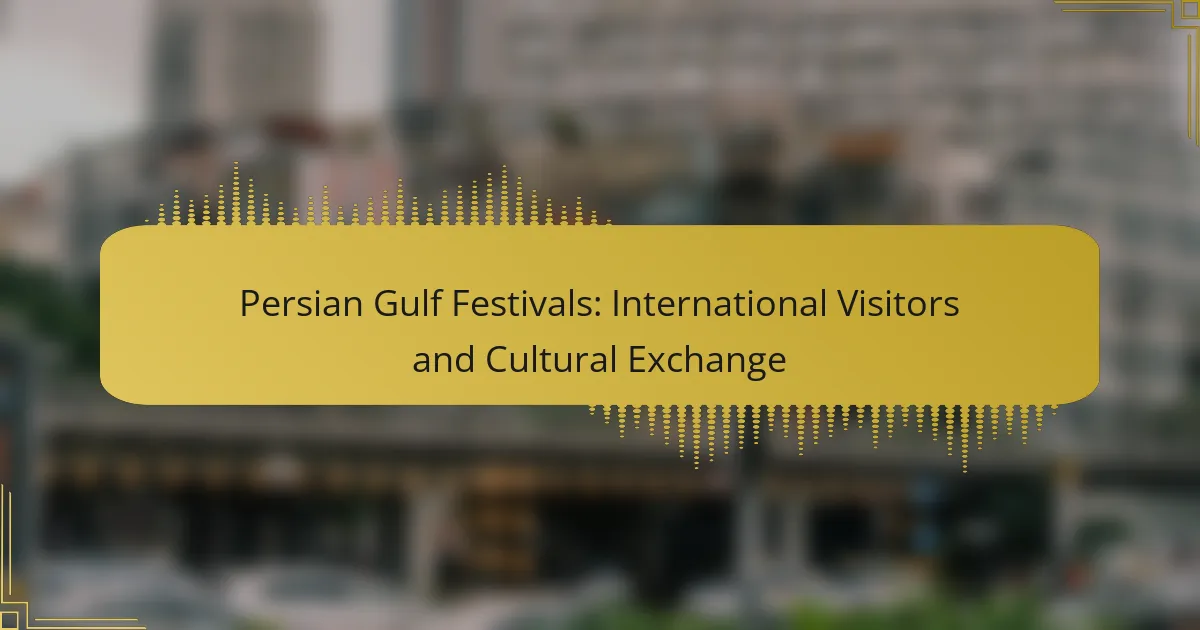The Persian Gulf region is renowned for its vibrant festivals that draw international visitors and encourage cultural exchange. These celebrations highlight local traditions, cuisine, and arts, providing attendees with unique and immersive experiences. By fostering dialogue and collaboration among diverse communities, these events enhance mutual understanding and appreciation of cultural heritage.
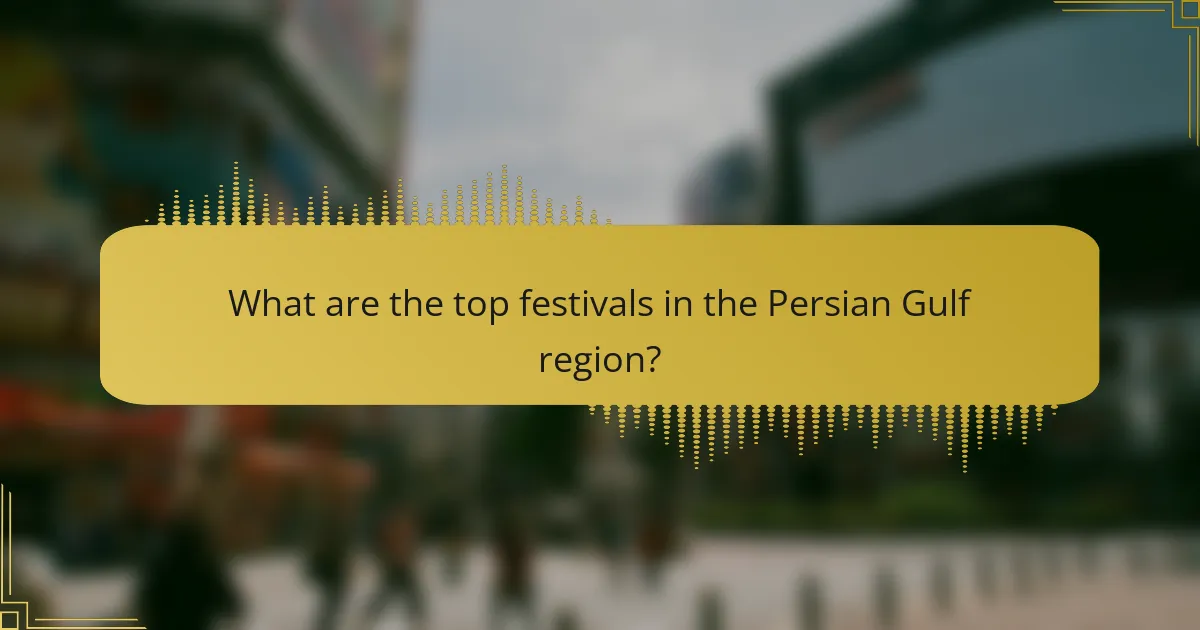
What are the top festivals in the Persian Gulf region?
The Persian Gulf region hosts a variety of vibrant festivals that attract international visitors and promote cultural exchange. These events showcase local traditions, cuisine, arts, and entertainment, offering unique experiences for attendees.
Dubai Shopping Festival
The Dubai Shopping Festival is a month-long event held annually, typically in January. It features massive discounts, entertainment shows, and cultural activities, making it a major draw for tourists looking to indulge in shopping and local culture.
Visitors can enjoy a range of activities, from fashion shows to fireworks displays. The festival also includes competitions and raffles, offering prizes that can be worth thousands of dirhams, enhancing the shopping experience.
Qatar International Food Festival
The Qatar International Food Festival celebrates the culinary diversity of the region, usually taking place in March. This festival showcases local and international cuisines through food stalls, cooking demonstrations, and tasting events.
Attendees can sample dishes from various cultures and participate in workshops led by renowned chefs. The festival also emphasizes sustainability and local ingredients, making it a great opportunity to explore Qatar’s food scene.
Abu Dhabi Film Festival
The Abu Dhabi Film Festival, held annually in October, focuses on promoting Arab cinema and international films. It features screenings, panel discussions, and workshops, attracting filmmakers and enthusiasts from around the world.
This festival provides a platform for emerging talents and established filmmakers alike, with awards presented for various categories. Visitors can engage with filmmakers and participate in Q&A sessions, enriching their understanding of film as an art form.
Bahrain International Music Festival
The Bahrain International Music Festival, typically held in October, celebrates music from various genres and cultures. It features performances by local and international artists, creating a vibrant atmosphere for music lovers.
Workshops and masterclasses are also part of the festival, allowing attendees to learn from professionals. The event emphasizes cultural exchange, making it a significant occasion for both local and visiting musicians.
Muscat Festival
The Muscat Festival is an annual event in Oman, usually occurring in January and February. It highlights Omani culture through traditional performances, arts, crafts, and food, attracting a diverse audience.
Visitors can explore various pavilions showcasing Omani heritage, participate in cultural activities, and enjoy local cuisine. The festival fosters community spirit and promotes tourism, making it a key event in the region’s calendar.
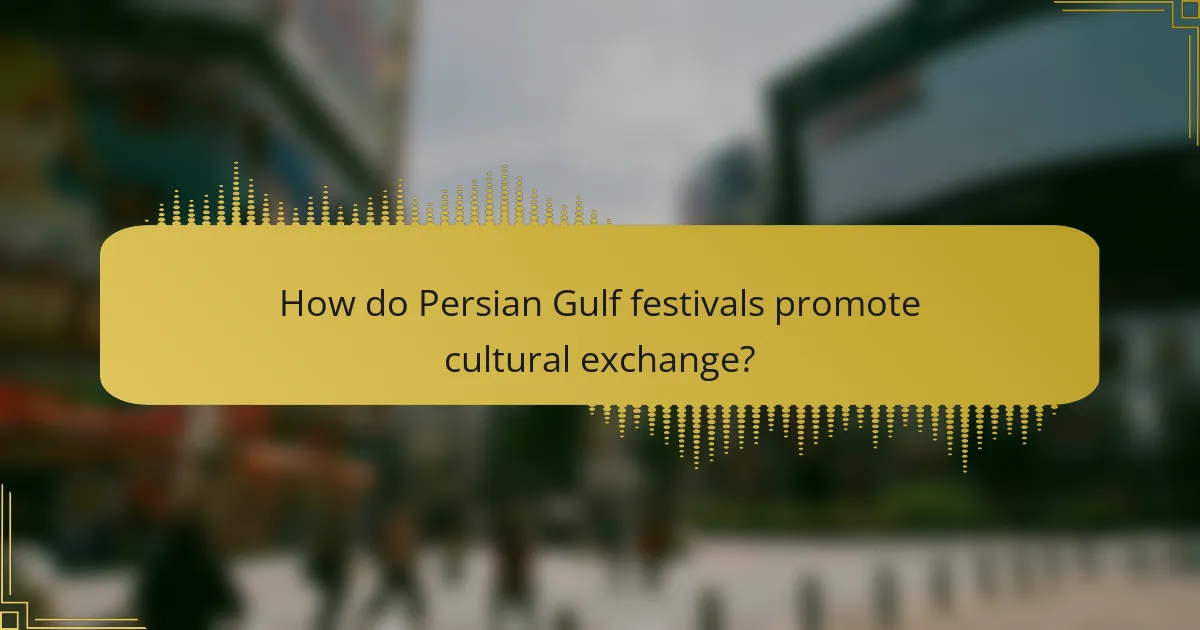
How do Persian Gulf festivals promote cultural exchange?
Persian Gulf festivals foster cultural exchange by bringing together diverse communities to celebrate shared traditions and artistic expressions. These events create opportunities for dialogue, collaboration, and mutual understanding among international visitors and local populations.
Showcasing local traditions
Persian Gulf festivals prominently feature local customs, music, dance, and cuisine, allowing visitors to experience the region’s rich heritage firsthand. For example, events like the Sharjah Heritage Days highlight traditional crafts and performances, offering workshops that engage attendees in local practices.
By showcasing these traditions, festivals help preserve cultural identity while inviting global audiences to appreciate and participate in local ways of life. This exchange enhances the visibility of Persian Gulf cultures on an international stage.
Encouraging international collaborations
Many Persian Gulf festivals actively seek partnerships with international artists and cultural organizations, fostering collaborative projects that blend different artistic styles. These collaborations often result in unique performances and exhibitions that reflect a fusion of cultures.
For instance, festivals like the Abu Dhabi Festival invite artists from various countries, creating a platform for cross-cultural dialogue and innovation. Such collaborations not only enrich the festival experience but also strengthen ties between nations.
Attracting global artists
Persian Gulf festivals attract a wide range of global artists, enhancing the cultural landscape and providing local audiences with exposure to international art forms. Events like the Doha Film Festival and the Bahrain Arts Festival feature filmmakers, musicians, and visual artists from around the world.
This influx of talent encourages local artists to engage with new ideas and techniques, promoting artistic growth and diversity. Additionally, it positions the Persian Gulf as a vibrant hub for cultural exchange, drawing visitors eager to experience this artistic melting pot.
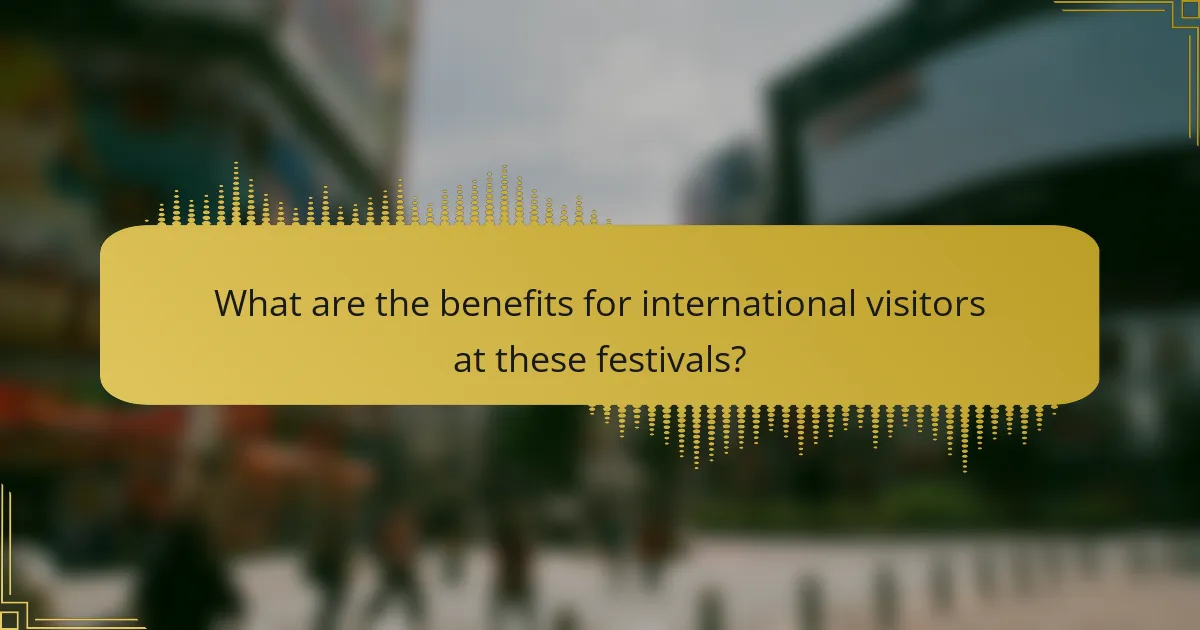
What are the benefits for international visitors at these festivals?
International visitors at Persian Gulf festivals enjoy a variety of benefits, including immersive cultural experiences, opportunities to connect with local artists, and a chance to savor diverse cuisines. These elements foster cultural exchange and enhance the overall festival experience.
Access to unique cultural experiences
Persian Gulf festivals offer international visitors access to rich cultural experiences that are often unavailable elsewhere. Attendees can engage in traditional music, dance performances, and art exhibitions that showcase the region’s heritage.
For example, festivals may feature live performances of local instruments, storytelling sessions, and workshops on traditional crafts. Participating in these activities allows visitors to gain a deeper understanding of the local culture and its historical significance.
Networking opportunities with local artists
These festivals provide excellent networking opportunities for international visitors to connect with local artists and creators. Engaging directly with artists can lead to collaborations, exchanges of ideas, and insights into the artistic processes unique to the region.
Visitors can attend panel discussions, artist talks, and meet-and-greet sessions that facilitate meaningful interactions. This networking can be particularly beneficial for those in creative industries looking to expand their horizons and explore new inspirations.
Exposure to diverse cuisines
International visitors at Persian Gulf festivals can indulge in a wide array of diverse cuisines that reflect the region’s culinary richness. Food stalls and local restaurants often showcase traditional dishes, allowing attendees to experience flavors that are distinct to the Gulf area.
From aromatic spices to unique cooking techniques, visitors can sample dishes such as kebabs, biryanis, and various seafood specialties. This culinary exploration not only satisfies the palate but also offers insights into the cultural significance of food in the region.
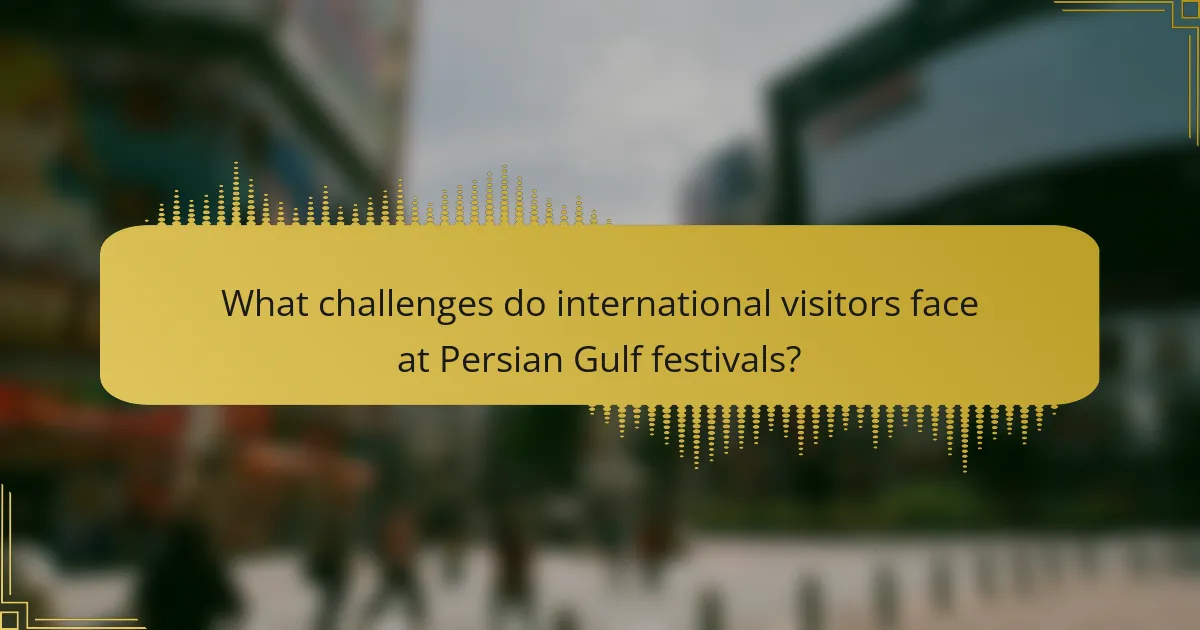
What challenges do international visitors face at Persian Gulf festivals?
International visitors at Persian Gulf festivals often encounter challenges related to cultural differences, language barriers, and logistical issues. Understanding these obstacles can enhance the experience and facilitate smoother participation in these vibrant events.
Cultural differences
Cultural differences can significantly impact how international visitors experience Persian Gulf festivals. Customs, traditions, and social norms may differ greatly from those in visitors’ home countries, potentially leading to misunderstandings or discomfort. For example, dress codes may be more conservative, and certain behaviors considered acceptable elsewhere might be frowned upon.
To navigate these cultural nuances, visitors should research local customs before attending. Engaging with local communities and seeking guidance from festival organizers can also help bridge cultural gaps and foster a more enjoyable experience.
Language barriers
Language barriers pose a significant challenge for international visitors at Persian Gulf festivals. While many locals may speak English, fluency can vary, making communication difficult. This can affect everything from asking for directions to understanding festival schedules and activities.
To overcome language obstacles, visitors can learn a few basic phrases in Arabic or the local dialect. Additionally, using translation apps can facilitate communication and help visitors connect with locals more effectively.
Logistical issues
Logistical issues, such as transportation, accommodation, and festival scheduling, can complicate the experience for international visitors. Festivals may be held in various locations, and navigating public transport or finding suitable lodging can be challenging, especially during peak tourist seasons.
To mitigate these logistical challenges, visitors should plan their trips well in advance. Booking accommodations early, familiarizing themselves with local transportation options, and checking festival schedules can help ensure a smoother experience. It’s also wise to have a backup plan for transportation in case of delays or cancellations.
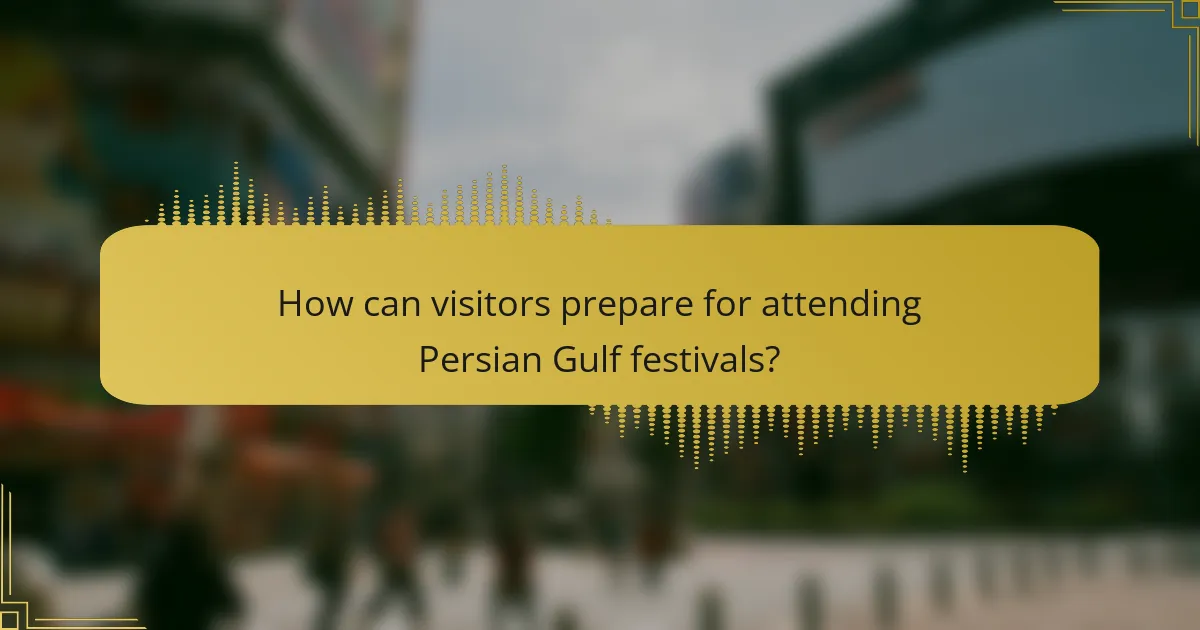
How can visitors prepare for attending Persian Gulf festivals?
Visitors can prepare for attending Persian Gulf festivals by researching the events, understanding local customs, and planning their travel accordingly. Being informed about the festival schedules and cultural practices enhances the experience and ensures respectful participation.
Research festival schedules
Understanding the festival schedules is crucial for maximizing your experience at Persian Gulf festivals. These events often span several days and feature a variety of activities, including music performances, art exhibitions, and culinary showcases.
Check official festival websites or local tourism boards for accurate dates and times. Many festivals have specific themes or highlight particular cultural aspects on certain days, so knowing the schedule can help you prioritize which events to attend.
Consider using social media platforms to follow festival updates and engage with other attendees. This can provide real-time information on any changes to the schedule or special announcements, enhancing your overall experience.
